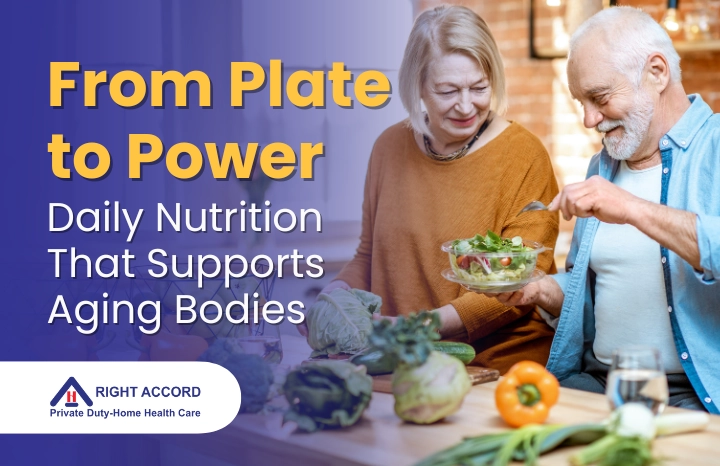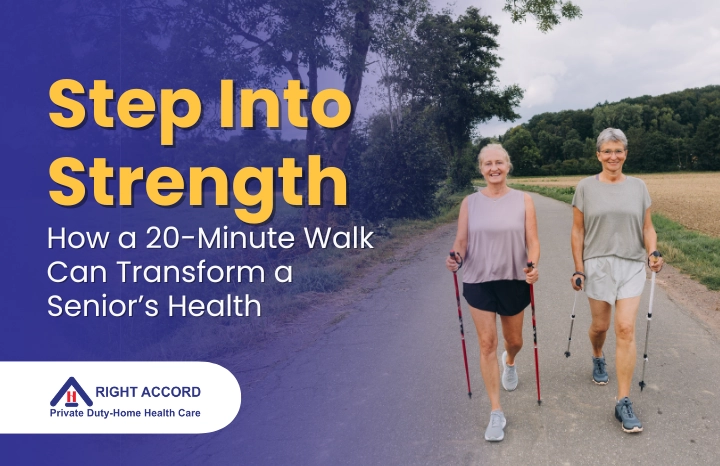· 4 min read
From Plate to Power: Daily Nutrition That Supports Aging Bodies
As we age, maintaining mobility becomes one of the most crucial components of living independently and with dignity. For older adults, every step matters—literally. And while physical therapy and exercise are essential, many underestimate the power of food in fueling those daily movements.

The right foods can reduce inflammation, strengthen bones, improve joint health, and enhance energy levels—making walking, bending, and stretching much easier. In this guide, we’ll dive deep into the best daily foods for seniors to support strong mobility, boost flexibility, and promote overall vitality.
🦴 Why Nutrition Matters More with Age
As the body ages, it naturally begins to lose bone density and muscle mass. Joints may become stiffer, balance may decrease, and fatigue can set in quicker. But what many don’t realize is that these changes can be slowed—or even reversed—with proper nutrition. Good mobility isn’t just about exercise. It starts in the kitchen.
🥦 1. Anti-Inflammatory Foods = Healthier Joints
Inflammation is a leading cause of joint pain, especially for those with arthritis or osteoporosis. A diet filled with anti-inflammatory foods can act like natural medicine for your body. Eat More Of: Berries (blueberries, strawberries): Packed with antioxidants Leafy greens (spinach, kale, arugula): Rich in vitamin K Fatty fish (salmon, sardines): Loaded with omega-3s Turmeric & ginger: Natural inflammation fighters Olive oil: Great alternative to processed fats Tip: Try a spinach and berry salad topped with salmon and an olive oil vinaigrette—delicious and powerful!
💪 2. Protein-Rich Foods for Muscle Strength
Muscle loss, or sarcopenia, begins around age 30 but becomes more noticeable after 60. Keeping muscle mass is key to mobility—and seniors should aim for protein in every meal. Include Daily: Eggs Lean meats (chicken, turkey) Beans and legumes Tofu and tempeh Greek yogurt Protein helps build and maintain muscle, giving you the strength to walk, carry groceries, or get up from a chair with ease.
🥛 3. Calcium + Vitamin D = Stronger Bones
Falls are one of the leading causes of injury in seniors, and weak bones increase that risk. Calcium and vitamin D work together to build and protect bone strength. Top Sources: Milk, cheese, and yogurt Sardines and canned salmon (with bones) Broccoli and bok choy Fortified orange juice and cereals Vitamin D from sunlight or supplements Make it a habit to include at least two calcium-rich foods in your day. And don’t forget to step outside for a few minutes of sunlight—it helps your body activate vitamin D.
💧 4. Hydration Helps Movement Too
Did you know dehydration can lead to muscle cramps, dizziness, and fatigue? Seniors are more susceptible to dehydration due to reduced thirst signals. Try This: Drink 6–8 cups of water per day Infuse water with lemon, cucumber, or mint for flavor Eat hydrating foods like watermelon, cucumbers, and oranges Staying hydrated keeps your joints lubricated and your energy up—both essential for movement.
🍠 5. Complex Carbs for Energy and Stamina
Carbs often get a bad rep, but older adults need healthy carbohydrates to stay energized throughout the day. Avoid sugar spikes and crashes by choosing whole foods over processed snacks. Healthy Choices: Sweet potatoes Brown rice and quinoa Oats Whole wheat bread and pasta Lentils and beans These complex carbs digest slowly, providing a steady stream of energy so you can stay active longer.
🍌 6. Magnesium & Potassium: The Unsung Mobility Heroes
These minerals play a vital role in muscle function and nerve signals. A lack of potassium or magnesium can lead to muscle weakness, cramps, and irregular heartbeats. Get More From: Bananas Avocados Nuts and seeds Dark chocolate (yes, in moderation!) Spinach and beans Make sure to add a banana or handful of almonds to your daily routine.
🍽️ Sample Daily Meal Plan for Senior Mobility
Here’s a simple, mobility-boosting daily meal plan: Breakfast: Greek yogurt topped with berries and chia seeds Whole grain toast with avocado Herbal tea or water with lemon Lunch: Grilled salmon with quinoa and sautéed spinach A side of roasted sweet potatoes Glass of water or coconut water Snack: Handful of mixed nuts and a banana Dinner: Chicken and vegetable stir fry with brown rice Side salad with olive oil dressing Warm turmeric milk or herbal tea
🚫 Foods to Limit or Avoid
Not all foods are mobility-friendly. Some increase inflammation and drain your energy. Watch Out For: Sugary snacks and drinks Processed meats Fried foods Excess salt (it contributes to water retention and joint discomfort) Alcohol Opt for home-cooked, whole food meals whenever possible.
🧘♂️ Nutrition + Movement = Long-Term Independence
While a good diet alone won’t replace physical activity, it gives the body the tools it needs to move, heal, and thrive. When paired with gentle daily movement—like walking, yoga, or stretching—nutrition becomes a powerful ally in aging well.
💬 Ready to Help Your Loved One Thrive?
At RIGHT ACCORD Private Duty – Home Health Care, we go beyond just providing care. We focus on whole-person wellness, supporting our clients in Sarasota, Venice, Manatee, Lee, and Charlotte Counties with personalized in-home care, mobility assistance, and healthy lifestyle coaching.
📞 Call us today at 941-366-0801
🌐 Visit: www.rightaccordhealth.com
Let’s help your loved one eat well, move more, and live fully.



